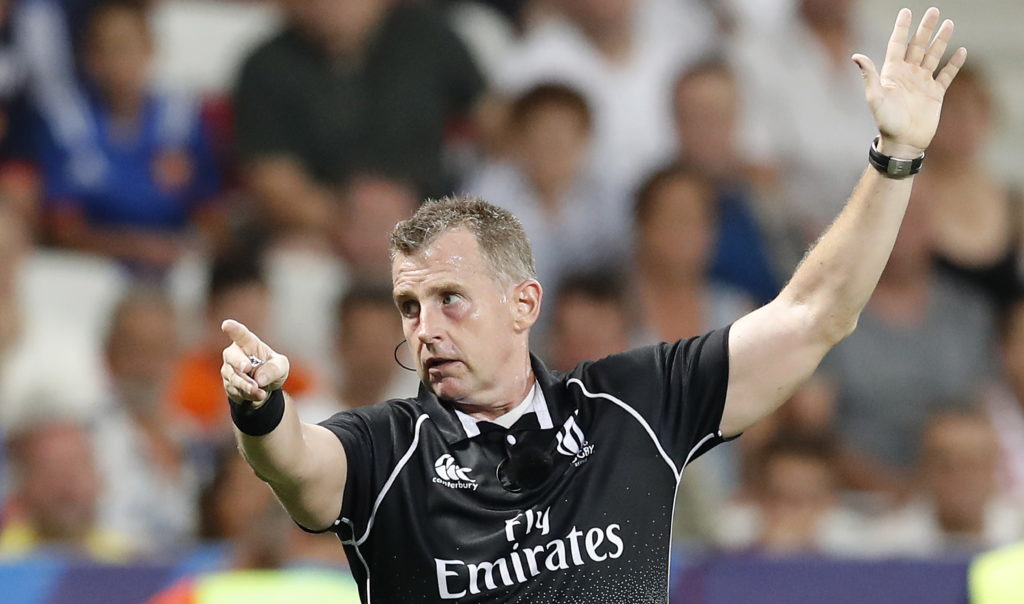Renowned referee Nigel Owens has urged authorities to abolish the captain’s challenge and the new red-card law, which introduces a substitute after 20 minutes, because it is spoiling the game.
In his column for WalesOnline, Owens voiced his unhappiness with the captain’s challenge that has come under much criticism in recent weeks, as several games in the Guinness PRO14 Rainbow Cup have seen significant TMO usage as a result of the law trial.
While both law changes are currently only being trialled for the Rainbow Cup and could both be removed after the tournament ends, Owens wrote that he fears it is turning people away from the sport.
‘Rugby, like any other sport, has to move with the times and as a referee I understand the need from time to time to trial experimental new laws in certain competitions.
‘It’s always happened down the years. Sometimes these trials are successful and the new laws become permanent right across the game. On other occasions they clearly don’t work and tend to be banished at once.
‘That’s fair enough, it’s what a trial is about, the proof of the pudding determines the outcome. Which is how it should be.
‘And so to the Captain’s Challenge and the orange card, two new laws that we have been experimenting with in the PRO 14’s Rainbow Cup tournament.
‘For differing reasons, neither can be remotely construed as a success. Indeed, the game is looking a bit lost with them, people are telling me they have stopped watching rugby.
‘Can you really blame them? We’re getting to the stage where sometimes on a weekend there is more time spent with referee in conversation with the TMO upstairs than there is actually ball in play time.
‘That’s not a good look for a sport where fast pace, drama and moving on to the next phase in play are part of the huge appeal.
‘This kind of thing is spoiling the game; everyone accepts a match can drag on a little when the clock goes red, but almost half an hour extra for a half of rugby? People simply aren’t going to go to the stadium if they know games are going to be dragging on and on like this.
‘We’re getting captains making their challenges more in hope, at times, than with any real expectation of getting a decision overturned in their favour. We’re seeing referees having to go to the TMO to review those challenges – on top of already doing it as often as six or even eight times a game anyway as they appear to be checking just about everything these days.
‘The occasional TMO call brings suspense, drama and excitement to the occasion and more importantly it helps get the key decisions correct; but when it gets used for pretty much anything these days it has the opposite effect.
‘What we badly need to do is get back to is the original reason the TMO was introduced, which was to help check the act of scoring a try was legal when there was an element of doubt, or a clear act of foul play that has been missed.
‘We need to stop going back to check if a pass was slightly forward, or if a player was an inch or two in front of a kick and chase. The on field officials need to get these decisions, not rely upon technology.
‘Come on, what’s actually happened to the art of actually refereeing the game – which is what we’re supposed to be there in the middle to do.
‘It seems to me today that some referees don’t appear to worry too much if they miss something, or blow for what looks like foul play, because they know they have the back-up of going to the TMO. Or, in the Rainbow Cup, they know the captain can challenge – and they can then go to the TMO again.
‘So if they’ve got it wrong, they know the right decision will be arrived at in the end. But at what cost to the game, given we have halves of rugby lasting close on half an hour more than they should.
‘It’s akin to me of walking on a tightrope in a circus. If you’re 60 feet up in the air, and have the knowledge a net is just below you, then you’ll just waltz across and not overly-worry so much. If there is no net, I guarantee concentration levels would be at their absolute optimum.’
Photo: Getty Images





